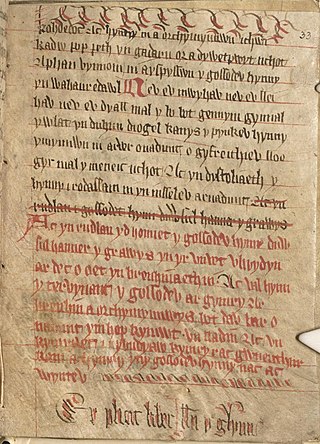
Prince of Wales is a title traditionally given to the male heir apparent to the English, and later British, throne. The title originated with the Welsh rulers of Gwynedd who, from the late 12th century, used it to assert their supremacy over the other Welsh rulers. However, to mark the finalisation of his conquest of Wales, in 1301, Edward I of England invested his son Edward of Caernarfon with the title, thereby beginning the tradition of giving the title to the heir apparent when he was the monarch's son or grandson. The title was later claimed by the leader of a Welsh rebellion, Owain Glyndŵr, from 1400 until 1415.
A principality can either be a monarchical feudatory or a sovereign state, ruled or reigned over by a regnant-monarch with the title of prince and/or princess, or by a monarch with another title considered to fall under the generic meaning of the term prince.

The Laws in Wales Acts 1535 and 1542 or the Acts of Union, were Acts of the Parliament of England under King Henry VIII of England, causing Wales to be incorporated into the realm of the Kingdom of England.

The Statute of Rhuddlan, also known as the Statutes of Wales or as the Statute of Wales, was a royal ordinance by Edward I of England, which gave the constitutional basis for the government of the Principality of Wales from 1284 until 1536.

The Millennium Stadium, known since 2016 as the Principality Stadium for sponsorship reasons, is the national stadium of Wales. Located in Cardiff, it is the home of the Wales national rugby union team and has also held Wales national football team games. Initially built to host the 1999 Rugby World Cup and replacing the National Stadium, it has gone on to host many other large-scale events, such as the Tsunami Relief Cardiff concert, the Super Special Stage of Wales Rally Great Britain, the Speedway Grand Prix of Great Britain and various concerts. It also hosted FA Cup, League Cup and Football League play-off finals while Wembley Stadium was being redeveloped between 2001 and 2006, as well as football matches during the 2012 Summer Olympics.

The South Wales Echo is a daily tabloid newspaper published in Cardiff, Wales and distributed throughout the surrounding area. It has a circulation of 6,026.

The Principality of Wales was originally the territory of the native Welsh princes of the House of Aberffraw from 1216 to 1283, encompassing two-thirds of modern Wales during its height of 1267–1277. Following the conquest of Wales by Edward I of England of 1277 to 1283, those parts of Wales retained under the direct control of the English crown, principally in the north and west of the country, were re-constituted as a new Principality of Wales and ruled either by the monarch or the monarch's heir though not formally incorporated into the Kingdom of England. This was ultimately accomplished with the Laws in Wales Acts 1535–1542 when the Principality ceased to exist as a separate entity.

The media in Wales provide services in both English and Welsh, and play a role in modern Welsh culture. BBC Cymru Wales began broadcasting in 1923 have helped to promote a form of standardised spoken Welsh, and one historian has argued that the concept of Wales as a single national entity owes much to modern broadcasting. The national broadcasters are based in the capital, Cardiff.
Merthyr RFC is a Welsh rugby union club based in Merthyr Tydfil in South Wales. Merthyr RFC are members of the Welsh Rugby Union, playing in the Principality Premiership, and are a feeder club for Cardiff Rugby.

Corwen F.C. is a Welsh football club based in Corwen, Denbighshire. They currently play in the Ardal NW League.

The Cambrian, a weekly newspaper started by George Haynes and L. W. Dillwyn in 1804, was the first newspaper published in Wales. Its original publisher was Thomas Jenkins. The full masthead proclaimed The Cambrian and Weekly General Advertiser for Swansea and the Principality of Wales. By 1906 it was acquired by South Wales Post Newspapers Co. and, in 1930, merged with Herald of Wales. Many articles in this newspaper have been indexed and the index is searchable at https://archive.swansea.gov.uk/cambrian

Unionism in Wales is the political view that supports a political union between Wales and the other countries of the United Kingdom. As well as the current state of the UK, unionism may also include support for Federalism in the United Kingdom and a United Kingdom Confederation.

The Welshman was a weekly 'radical' English language Welsh newspaper, reporting local and national news and information. It was published in Carmarthen and distributed in the Cardiganshire area and through much of South Wales.
Knyvett Crosse was a Welsh international footballer. He was part of the Wales national football team between 1879 and 1881, playing 3 matches and scoring 1 goal. He played his first match on 7 April 1879 against Scotland and his last match on 14 March 1881 against Scotland.
The 1894–95 Welsh Amateur Cup was the fifth season of the Welsh Amateur Cup. The cup was won by Caergwrle Wanderers who defeated Bangor Reserves 2–1 in the final, at Flint.
The 1919–20 Welsh Amateur Cup was the 25th season of the Welsh Amateur Cup. This was the first time the Competition had been played, following a five-year gap due to World War I. The cup was won by Caerau who defeated Barmouth Comrades 4–1 in the final to become the second team from South Wales to win the Cup.
The 1880 Welsh Cup Final, was the third in the competition. It was contested by Druids and Ruthin at the Racecourse Ground, Wrexham.

Thomas Eyton-Jones JP, FRCS, was a significant figure in Wrexham in the 19th century. Working as a surgeon, physician, magistrate, local politician and army officer, he is best known for his role as a medical professional.

Dragon's Heart Hospital was a temporary hospital located at the Millennium Stadium in Cardiff. It opened on 13 April 2020 to help deal with the impact of the COVID-19 pandemic in Wales. It was decommissioned towards the end of October and early November 2020.













